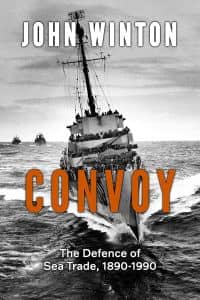An authoritative examination of the role of convoy between 1890 and 1990.
Convoy is at the heart of naval history. The Navy had indeed been first formed specifically for convoy protection: the nation’s prosperity and security depending upon the safe passage of ships carrying troops and merchandise, in convoy, ever since the Middle Ages.
So why was the subject of trade defence so frequently and keenly debated? How did the best navy in the world come to abandon its oldest and best practice when it needed it the most?
Naval historian John Winton examines the controversy — whether in time of war vessels can be better protected in convoys or sailing individually in protected sea-lanes — and traces the arguments leading to the adoption of the convoy system in the First World War and, despite its resounding success, grudging adoption in the Second.
The author shows how the advantage in the Battle of the Atlantic swung back and forth until, in 1943, the German submarine fleets attempting to cut through Britain’s shipping arteries were finally driven back by convoy escorts and long-range aircraft, assisted by sophisticated new radar equipment. The discovery was made that convoy was more than a cautious defence: it was actually the best offensive weapon against the U-boats.
John Winton’s expert analysis of the records combined with his knowledge of naval history result in a comprehensive study of convoy sure to appeal to all maritime enthusiasts and those keen to learn more about naval strategy between 1890 and 1990.
